Living in a homestead without a dog, is like living in a house with no electricity. It just doesn’t feel right. Homesteads are renowned for having a four legged buddy around for security, hunting, or herding purposes.
I can boldly attest to the popular line that says “a dog is a man’s best friend.” Truly it is – running a homestead is a labor intensive endeavor, and having a dog around can make your life so much easier.
There are many different types of dog breeds you can choose from, however be warned: choosing the right type of breed is as critical as choosing your life partner.
Some dog breeds are so beautiful on the outside whilst they can be so aggressive on the inside. They might spread their love to you “the owner” but rack havoc upon your most delicate farm animals, such as poultry and young livestock, so choose wisely!
How To Choose The Right Dog Breed For Your Homestead
Just to get this clear from the get-go: there is no right or wrong dog breed, though there are ones that are more right than others to have around in your homestead. This is about what you want and what your needs are. Also please note that the dog breeds mentioned in the article are selected from my point of view; opinion based from my experience with dogs and from my homestead.
The first thing to consider when choosing a dog breed is this:
The Purpose Of The Dog
Are you looking for a dog to:
- Help you hunt.
- Protect your livestock against wild animals.
- Alert you of unwanted guests.
- Or just to be a companion.
The Question is: Why?
Whatever the reason, note it down and go to the second consideration, which is:
The Type Of Farm Animals You Have
Which type of farm animals currently reside on your property?
Chickens? Sheep? Cows? Or you don’t have any?
Some dogs are said to have a high prey drive which is the tendency of a dog to want to chase, fight, grab, play with, or mistakenly or purposefully kill your small animals.
Examples of these types of dogs are: Boston Terriers, Australian Cattle Dogs and Whippets. Try to avoid these if you do have small or delicate animals, such as poultry and rabbits.
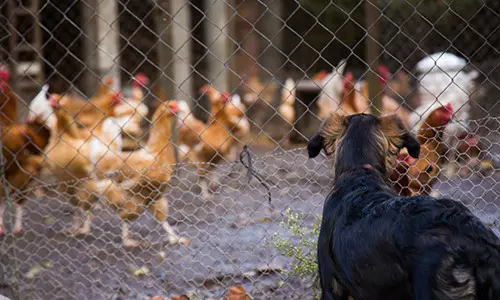
Best Dog Breed For Hunting
Hunting dogs often have a high prey drive, so choosing one to accompany you at your homestead is a tricky equation. From my experience and biasness, I have only one that I consider “the best” which is:
The Norwegian Elkhound
Feeding: 6 cups of dog food a day (1 cup is about 1 lb.)
Energy levels: High. A Norwegian Elkhound has very high energy levels that it spends most of its day upright; walking, or running around. Make sure you create some regular time to play fetch, or better yet, have two Elkhounds so they can spend the day playing together.
The Norwegian Elkhound’s hunting skills are unparalleled in the dog community in my opinion. They are like no other. If you want to hunt something big and not just some ducks, your best bet of catching the big one is with a Norwegian Elkhound. 90% of all hunted elks in Norway are taken down with the assistance of a these dogs.
Though tenaciously brutal in the battlefield, these four legged beasts are the total opposite when it comes to home life. They usually get along well with other farm animals, and would never lift a paw to hurt any of them.
Their undying love and loyalty to you, “the owner”, causes it to handle anything that you love with the same utmost care and respect that you give it. The only downfall I have noticed about this type of breed, is that their loyalty is often attached primarily to the alpha of the human family.
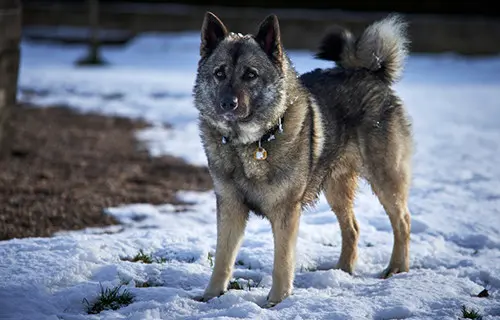
Best Dog Breed For Protection
If some kind of disaster will come, who can you trust to give you a heads up when SHTF?
You’re right: your watchdog.
This type of breed will protect you and try as best as possible to deter the danger away from you and your assets. The best example I can give you here is:
The German Shepherd
Feeding: 5-6 cups of dog food (1 cup is about 1 lb.)
Energy Levels: Medium to high. German Shepherds are high energy dogs who tend to act like medium energy dogs. They remain calm and relaxed when they are not working, but often display their high energy levels in the line of duty.
Have you ever wondered why the police choose German Shepherds to help them guard against criminals?
Because that is their specialty. Having had a German Shepherd called “Spotty,” I never had to worry about any fox or wolf ravaging through my livestock.
German Shepherds are very trainable, they are athletic and most of all they are a good family dog. They will do whatever it takes to protect you, your family, your farm animals, and assets as a whole.
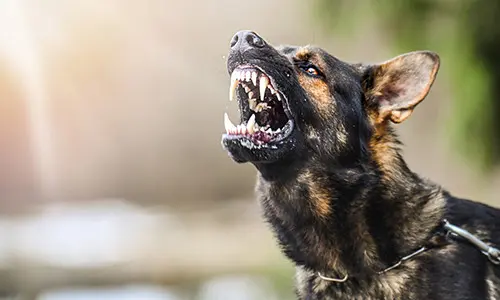
Best Dog Breed For Herding
Herd dogs, like watchdogs tend to be very trainable. They are usually very eager to please you, by learning your commands very quickly.
Any dog with the words “shepherd, cattle, or sheep” all probably fall into this category. This type of breed is characterized with having a lot of fur around the body. Why? I don’t know. Maybe to be able to stay all day into bad weather.
If your homestead has livestock, you must consider choosing this breed.
The Australian Shepherd
Feeding: 6 cups of dog food a day. (1 cup is about 1 lb.)
Energy levels: High. Australian Shepherds hate being in a confined area. They need space to run from one corner to another. They are often very eager to work, and if there isn’t any, they’ll often find one for themselves.
Australian Shepherds tend to have exuberant amounts of energy. They usually take the livestock to the pastures and back, in a much more orderly manner than a human could. They can easily fight off and scare away wild animals trying to prey on your livestock
Their stamina, strength and determination for a cause to listen and execute your instructions, make them an invaluable part of any homestead.
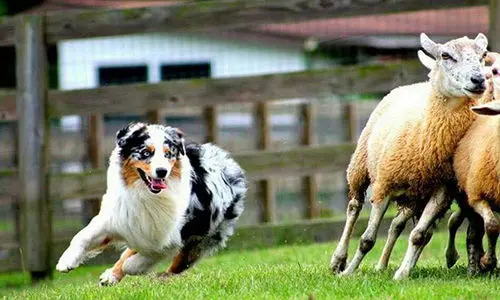
Best Dog Breed For Alerting
Alert dogs are often small, noisy, and have a very bad temper towards outsiders. They double down their alerting capabilities by being a great companion to the owner. Alert dogs are often allowed in the house as well as sleep in it in most cases. A good example I can give here is:
The Chihuahua
Feeding: 2-3 cups of dog food a day. (1 cup is about 1 lb.)
Energy levels: Medium. Chihuahuas are often calm throughout the day, until there is something out of the ordinary that happens. They really love to play and spend time with the human family
There is one trait that you get from a Chihuahua that you don’t get from any other type of dog breed, and that is: attention to detail. If anything happens that it is not used to, you will surely know by their noisy bark. This bark often alerts you, as well as the other bigger dogs to stand guard. Nothing goes unreported when the “dog dwarfs” are around.
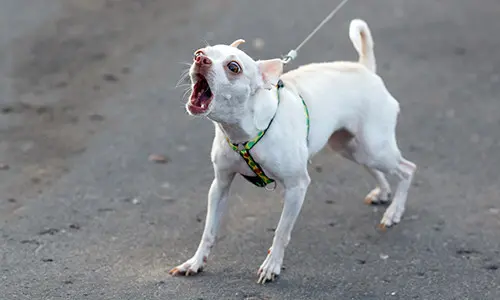
Related: Easy DIY Winter Doghouse
Even though I have phobias of dog breeds such as the Pit bull and Boer bull because of their reputation, I have learned from my best friend Bernie who happens to be a dog trainer that any dog can be trained to do anything, and that you should not have preconceived ideas.
A hunting dog for example, can be trained to be a protection dog, though it would be difficult, it is not impossible. True or not, my advice to you is this:
Do some extensive research on the breed that you want, coupled with using the formula I gave you at the beginning of this post, as well as asking other fellow homesteaders for recommendations. Then, surely you’ll make the right choice.
You may also like:
 The Best DIY Traps Against Property Intruders
The Best DIY Traps Against Property Intruders
Do you know why you should never put a tall fence around your house? (Video)
50 Off the Grid Homesteading Tips and Tricks

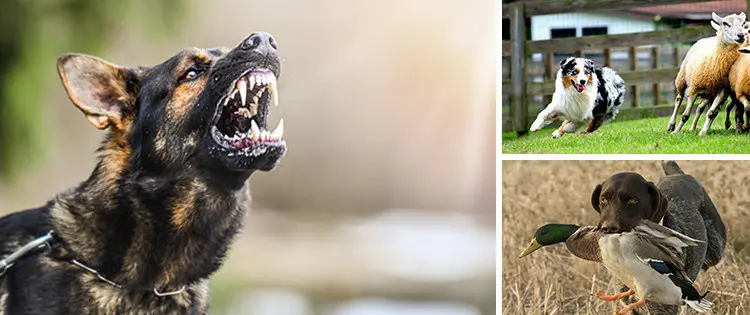








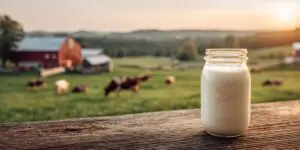

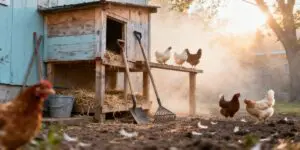

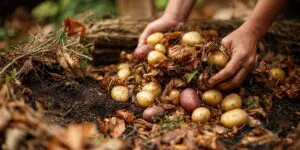
This was helpful. thanks
In the years before a friend gave us an elderly Great Pyrenees we had already lost countless birds and sheep to the unbelievable number of wild predators that would come right up to our house (coyote packs, raccoons, Bald eagles, foxes, wildcats, horned owls, several different varieties of hawks, etc.) Next came our half Great Pyr half Akbash mix, then finally a few years ago our part Great Pyr super-mut. These dogs average 120 pounds or so and therefore eat a huge amount, but earn every penny of this daily investment… they don’t need supervision to do their jobs either. That said, we had a very clever mountain lion two years ago that figured out the dogs sleep all day, that cat kept killing our sheep in broad daylight since the dogs only work at night. We also have a Border Collie/Australian shepherd mix, she’s great at bringing our animals in at night, but she also has to stay in the house at night since there’s no way she’d survive encounters with our bigger predators. Anyway, Great Pyrenees would be my personal pick for protecting both us and our livestock. Great subject, and a great article!
You may want to research the Giant Schnauzer- it is the largest of the 3 distinct schnauzer breeds and was bred to be a jack of all trades farm dog. At 75-100 lbs It is big enough to pull carts and carry a loads. It is an instinctual security/protection dog and is the only other dog breed that can hold its own against German Shepard Dogs in the Schutzhund competitions and it is also used by many police forces. It can herd and track. It has been used to hunt and has a strong prey drive but is has high control when trained. It is very caring and loving to all the family members. It was bred and trained to be somewhat self-driven and sufficient so it can act in an independent capacity. I have had 2 of them and they are truly amazing dogs and would fit almost all the bill as a homestead dog.
This site has always been amazing, and frankly, it is getting better and more diverse and detailed by the day. My recommendation, as I consider a potential competitor site (for which I have already purchased the website domain), is to ensure that the articles grow along with a diversity of expert opinions, reviews and research.
Each of these authors are undoubtedly incredibly intelligent and experienced in their advice and assessments, however the next wave of self-sufficiency/homesteading/etc will include a more researched, peer-reviewed and academically-sourced articles. Why?
The world, and the United States especially, have an impressive but overly complex logistically-networked system. As time goes on, and more challenges (e.g. COVID) are introduced, these systems only become increasingly delicate and vulnerable, leaving the unprepared in an impossible situation. Point?
MORE people will become attracted to self-sufficient living. It doesn’t *have* to be a contentious situation, however – and unfortunately – the lack of status-quo security and government-backed assurances, will no doubt make the situation contentious.
Regardless, while it will be important to convey the “community support/security” philosophy, it will be – in the meantime – just as necessary to provide the individual audience/customer with articles/advice that is not only old-school-tested but that is more and more supported by 21st century, academic/expert peer-reviewed, and advanced-tested information.
In the event of complete or partial “societal collapse”, we have to be careful not to allow a complete civilizational reversal to a pre-industrial quality of life. While all of this excellent and under-thanked self-sufficiency advice will certainly keep us from a pre-historic way of life, it requires just a bit more to keep us from a more abysmal civilizational reversal – requiring, first, a more advanced individual preparation, but , secondly, evolving into a community-considered preparation as well.
Why tip off a potential, future competitor? Because A) selfsufficientprojects.com & company are awesome! and B) the goal of preserving a larger, collective and more advanced human civilization is far more important.
Thank you. Can you sum up in a couple of sentences what the overall point you are driving at?
Would you consider choosing each dog for their individual speciality. Would they all get along?
I have 2 Pointers, a Rottweiler and a Cocker. And guess what? The Cocker is the most aggresive, but not necessarly in a dagerous way. Also I have trained my dogs from day 1. I don’t think the dogs will not get along if you invest time in their behavior; even if one is older and the newest member is younger, if you train them, all dogs will be OK with eachother.
We have owned German Shepherds, Chow Chow, Pit Bulls, Maltese, and a mutt. The Pit Bulls were just like the rest, they were good ol family dogs who loved people, and didn’t really care about animals or other dogs. The only thing that riled up one of our Pit Bulls would be a piece of paper or grocery bag blowing through the yard. Pit Bulls can be great dogs, if you get them from a good breeder and train them well (which I’d say is necessary for any breed). I’m not sure they would offer much in terms of being a working dog though, unless you train them to pull carts – which some people do.
By Hunting you must mean Elk or deer and not bird hunting… While good for Deer you couldn’t possibly recommend a Elk hound for water fowl or Pheasant hunting… and it would also depend on your climate…
I have a Maremma sheep/gaurd dog. He weighs about 250 pounds and he is a wonderful protector as well as a great pet. He cat naps off and on through the day but stays alert day and night. He is very territorial and will kill any kind of predator that comes onto my property, especially wolves and cayotes! He is also very protective over all live stock (including humans! LOL!)! The breed comes from Italy. A lot of people mistake him for a Great Pyrenees, but he is not!